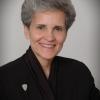"Have you come to believe because you have seen me? Blessed are those who have not seen and have believed."
From A Nun's Life podcasts - What was the most pleasant surprise you had after you became a nun? Hint, it has something to do with community.
"Why do we need the church? Why should we even look to the church to end racism when we can find other, better spaces to do that?" The college student's question was directed to Fr. Bryan Massingale, a Milwaukee priest and prominent Catholic voice for racial justice, during a post-Ferguson lecture in St. Louis last year.
Working as a maid has become a valued job in Vietnam, as public attitudes towards the profession change, thanks to the determined efforts by the Daughters of Charity of St. Vincent de Paul nuns. The sisters recently marked the 10th anniversary of training courses in housework for disadvantaged young women at the Salesian-run Phuoc Loc Vocational Training Center in the sourthern part of the country.
See for Yourself - "What time is it?" I think to myself. The only clocks at my residence are digital, so when the power is off, the clocks are off. Such was the scene during a powerful wind storm that rolled across the area uprooting trees and affecting power lines.
As I write this it is one of those perfect Michigan summer mornings — temperature in high 70s, low humidity, sun shining and the flowers fully blooming in all their rich colors. One of the sisters with whom I live is our gardener, and she has created a most splendid banquet of myriad flowers whose colors were profuse this morning. I so needed this "chapel" within which to pray.
"The Gospels are not scientific accounts giving us absolute knowledge about objective historical facts, not because such texts could not have been written, but because such facts are not what we need."
Jennifer Szweda Jordan is founder of Unabridged Press. She has worked as a journalist for more than two decades with small community newspapers as well as The Associated Press and NPR. Follow her on Twitter: @JeniferPossible.
Mary McCauley is a Sister of Charity of the Blessed Virgin Mary whose past ministries include administering at the BVM nursing home and directing health care ministry for an archdiocese. She served as pastoral administrator at three parishes, including St. Bridget's in Postville, a town of 2,200 people in northeast Iowa, where on May 12, 2008, Immigration and Customs Enforcement (ICE) carried out a raid at a meatpacking plant , a moment she says was "transforming."
GSR Today - I visited Thailand in 2008 and met members of the Karen community, including the Mae Pon Sisters. I never dreamed I would be meeting Karen community members from Myanmar (Burma) in Aberdeen, South Dakota.






